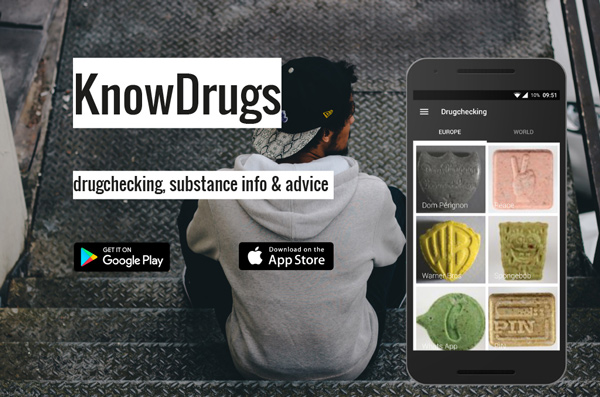
Cocaine
28. September 2016
Speed
28. September 2016What is it?
MDMA is a chemically produced substance related to amphetamine. The substance can be found in colorful ecstasy tablets with a printed design – also called parts or pills – or in crystal form. More rarely, MDMA is also sold as a powder or in capsules. Recently, highly concentrated liquids and pills have begun to appear, and their consumption has been linked to numerous overdoses, including cases of death.
The MDMA content in illegally manufactured drugs varies widely.This makes accurate dosing impossible and increases the likelihood of unexpected effects. Ecstasy tablets available on the (black) market are often very high in dosage exceeding 2 to 3 times an effective dose of MDMA. However, ecstasy tablets do not necessarily always contain MDMA.
It may contain other substances besides MDMA, such as extenders and the substances amphetamine, methamphetamine, mephedrone, ketamine, methylone, PMA, PMMA, and others whose interactions with each other are poorly known. Even pills that look the same can have completely different contents.
MDMA is also used to support psychotherapies, such as the treatment of post-traumatic stress disorder (PTSD).
How is it taken?
MDMA is mostly swallowed: tablets are portioned (as eighths, quarters or halves) or swallowed whole. Crystals are drunk dissolved in the drink, swallowed filled in paper or capsules (“bomb”) or “dipped” directly from the package with a moistened finger. Dipping can lead to unintentional overdoses more quickly, as you may misjudge the amount taken.
Less commonly, MDMA is also snorted.
When swallowed, the onset of action of MDMA can last 30 minutes or longer; the duration of action is 4 to 6 hours. An effective dose is about 1 mg of MDMA per kilogram of body weight. The maximum dose of 1.3 mg of pure MDMA per kg of body weight should not be exceeded. Partial oral consumption can take up to 90 minutes before the effect is noticed.
When snorted , the effect occurs after a few minutes and lasts for about 1-3 hours.
Since the effect is faster and stronger when sniffing, the dosage should be lower when sniffing. Nasal consumption of crystals can cause injury and irritation to the nasal mucosa.
How does it feel?
Every substance has a different effect on different people. The effect of MDMA depends on personal factors (body mass, habituation, ingested amount, on a full or empty stomach, …). An important role is played by your environment, and by your mental and physical condition.
When illegal substances are consumed, it is usually not known how much active ingredient is in the drug or parts of it. This makes accurate dosing difficult and increases the likelihood of unintended effects. Recently, there are many extremely high-dose pills in circulation. Watch out for current substance alerts and uses drug-checking services when possible.
MDMA causes nerve cells to release high levels of certain neurotransmitters, namely serotonin (“happiness hormone”), norepinephrine (“stress hormone”), and dopamine (“reward hormone”). It also inhibits the metabolism of serotonin. These transmitters are also present elsewhere in the body and regulate a person’s mood.
The prosocial MDMA effect (need to cuddle, feeling in love) is also explained by the release of the “cuddle hormone” oxytocin.
MDMA has a broad spectrum of effects, of which several are possible.
- MDMA use can produce compassionate effects: openness and feelings of connection to others, feelings of happiness, relaxation, increased sociability, disinhibition, and increased trust in others can occur.
- The effect of MDMA can touch one’s soul or inner feeling.. Own feelings are more intensely sensed.
- A stimulating effect is also possible: the heartbeat and body temperature are increased, physical touch is perceived differently, consumers experience euphoric states and a strong urge to move.
- A mild hallucinogenic effec is possible.
Side effects and long-term impact
Since the exact composition of MDMA is mostly unknown, you can never quite predict what effect consumption will have.
When you take MDMA, these side effects can occur:
- Dizziness
- headache
- nausea
- vomiting
- sweating
- increased heart rate
- Tingling under the skin
- Jaw cramp
- dry mouth
- Hunger, thirst, urinary urgency and exhaustion are suppressed (favors hypoglycemia, overheating, dehydration or circulatory collapse)
Suppressed urination, in combination with excessive drinking, can lead to hyponatremia (“water intoxication,” too little salt in the blood).
The consumption of MDMA puts a strain on the heart. Heart palpitations, circulatory disturbances in the heart and, in extreme cases, sudden cardiac death are possible. In rare cases, MDMA can trigger asthma or epileptic seizures.
MDMA can increase existing sadness or anxiety and cause depression, delusions, or paranoia.
MDMA empties serotonin stores in the brain. It takes up to a week for these to be replenished. For this reason, irritability, depressive moods, listlessness, fatigue or lack of concentration for several days are likely, especially after the effect has worn off.
Frequent consumption can lead to a lack of positive effects and a predominance of negative effects. In addition, regular use can permanently worsen mental health and contribute to learning disabilities. Whether and to what extent MDMA use causes permanent brain damage is not yet known.
Overdose
Overdose leads to:
- Overheating
- Muscle cramps
- hallucinations
- Liver or kidney failure
- Circulatory collapse
- unconsciousness
- Respiratory paralysis
MDMA/ecstasy use has already led to deaths in Europe. The extent to which other substances or contaminants and individual factors such as pre-existing conditions played a role in this process has not been conclusively clarified. It is now believed that for people whose bodies are particularly sensitive to MDMA, overdoses with pure MDMA can be fatal.
If discomfort persists, cramps increase, and circulation problems develop, get medical help. If you find a passed out person, check if they’re breathing, provide first aid and call an ambulance (112).
You can find more information about drug emergencies here. You can also contact these hotlines:
Drug emergency telephone: 01806 313031 (24 hours)Drug emergency service: 030 19237 (24 hours)
Drug combinations
Generally speaking: consuming more than one substance at a time puts your body and your mental state under more pressure. Certain effects may be intensified, weakened or delayed by the interactions. The risk of overdose or side effects becomes unpredictable.
- MDMA + alcohol: may cause dehydration.
- MDMA + cannabis: can increase the effect of MDMA and puts a strain on the circulation.
- MDMA + Speed:The effect of ecstasy is suppressed. Unintentional overdosage may occur if the material is added too quickly. The stimulant effects of both substances reinforce each other, leading to cardiovascular problems. Overheating or circulatory collapse are possible. Extreme serotonin concentration in the brain, possibility of (life-threatening) serotonin syndrome.
- MDMA + cocaine: Cocaine cancels the effect of MDMA. The combination can lead to aimlessness, inner turmoil and brokenness.
- MDMA + heroin: heroin suppresses MDMA effect, probability of overdose. The circulatory system is heavily stressed.
- MDMA + ketamine: Physical movement restrictions due to ketamine are no longer perceived under MDMA. This can lead to overestimating one’s own ability to move and perform.
- MDMA + LSD (Candyflip): : The substances reinforce each other’s effects. When the MDMA effect wears off, you may experience bad trips,unpleasant hallucinations, or depressed mood. Extreme serotonin concentration in the brain, possibility of (life-threatening) serotonin syndrome.
- MDMA + MAO inhibitors: unpredictable potentiation and prolongation of effects. A very heavy circulatory load can lead to collapse. Possibility of life-threatening serotonin syndrome!
- MDMA + mephedrone, crystal meth, LSD or other substances that release serotonin: can lead to a life-threatening serotonin syndrome!
- MDMA + drugs: Mixed use with antidepressants leads to amplification and prolongation of the effect. Very strong circulatory stress, can lead to collapse. Possibility of life-threatening serotonin syndrome!
In combination with medications that change the heart rate, the heart is put under a lot of stress. Changes in heart rhythm, sudden cardiac death possible. - MDMA + Viagra (Sextasy): The heart is subjected to double stress. Can lead to a permanent erection that does not subside.
Addiction potential and withdrawal
- The consumption of MDMA leads to a rapid formation of tolerance (habituation effect). This means that you would need to take more and more of the substance over time to achieve the same effect.
- The risk of developing a dependence on MDMA is low.
Because of the properties of MDMA, addiction does not manifest itself in daily use, but rather in direct association with occasions and places of use. For example, parties or certain groups of friends may not work for you without MDMA. - If you use regularly and a lot, you may experience physical and psychological withdrawal symptoms after you stop using. The main symptoms are: Mood swings, strong craving for the drug, and depressed mood.
- Self-organized “cold turkey” withdrawal (without medical consultation and care) can be physically and psychologically stressful. Find out which hospitals in your area offer addiction treatment.
Safer Use
- MDMA is most often found in ecstasy pills. However, these do not always consist only of MDMA, but sometimes also of other substances such as mephedrone and other cathinones, methylone, m-CPP, PMA, PMMAor other substances. The interactions – especially with MDMA – have hardly been researched. It may also be that ecstasy pills do not have anyMDMA.
- Ecstasy tablets are often very high in dosage. Pay attention to current substance warnings and, if possible, use drug-checking offers. When consuming, try on only a small amount (e.g. a quarter) and wait for the effect (do not add more!).
- Use only your own consumption utensils. Sharing tubes or injecting utensils (injecting utensils are uncommon with MDMA use) transmits infections.
- Always measure out your dose yourself. Do not transfer the responsibility for this to others. That way, you’re guaranteed to stay on top of things.
- It is never okay to administer substances to other people without their knowledge and consent! You endanger the life of a person and are liable to prosecution. If you witness such a situation, get help and protect the person being spiked.
- If you have little experience, try to avoid dipping. It is difficult to estimate the amount correctly.
- If possible, do not consume on an empty stomach. If you do, keep the dose lower.
- Mixed use makes unexpected and unwanted effects more likely. Avoid taking multiple drugs at the same time.
- Do not consume tablets nasally. Water-insoluble substances can cause clumping on the nasal mucosa and in the lungs.
- Nasal consumption can be tough on the nasal lining.
To save your nose a bit, you can chop up the crystals as finely as possible and then rinse them with saline solution. - Combining MDMA with MAO inhibitors or antidepressants is risky. Seizures (epileptic seizures) and circulatory collapse may occur. Mixed use of MDMA and MAO inhibitors leads to slower breakdown of MDMA and serotonin, etc. in the body, resulting in potentially life-threatening MDMA and serotonin levels.
- Take breaks from consumption of 6 weeks. By doing so, you’ll give your serotonin system a chance to recover and reduce the likelihood of depression.
- MDMA should not be used alone. genommen werden. Use with people you trust and feel comfortable with. Ideally, there should be someone who can stay sober and help if necessary.
- Only use MDMA when you are well and in a place where you feel comfortable.
- When dancing, don’t forget to ensure adequate hydration (about 500 ml per hour). There is otherwise a risk of dehydration. Salty snacks can help prevent a salt deficiency.
- Do not consume in: Asthma, diabetes, epilepsy, hypertension and disorders of cardiovascular regulation or psychological problems.
- Certain drug interactions pose a high health risk. Talk to your doctors about drug interactions.
- After consumption, you may feel out of tune, drained, or irritable. Plan the phase into your week and take it easy.
- Find an end when consuming and try to be abstinent when getting down. . Substance use aimed at shortening your downtime can lead to unexpected interactions and promote dependence.
Safer Sex
- MDMA increases the willingness to intentionally cross boundaries while abstaining from safe sex. This increases the risk of infection with HIV and other sexually transmitted infections.
- MDMA makes it more difficult to get/hold an erection and/or have an orgasm. The combination with Viagra (“Sextasy”) fixes this problem for some. The heart is doubly stressed and the mixture can lead to a permanent erection that does not subside. In this case, get medical help.
- If sex lasts longer, change the condom every half hour or consider a different protection strategy.
- Sex and drugs work only with mutual consent and trust. Clarify in advance which sex practices are wanted by both of you and which are not.
- Consume only so much that you can defend yourself or still recognize the defensive signals of your partner.
- Only sleep with people who can communicate boundaries and consent! If a person is so high that he or she is no longer able to converse, he or she is also incapable of giving consent. Under no circumstances may sexual acts be (further) performed on them. This is true even if mutual intentions were previously discussed while conscious. It is a criminal offense.
- Before getting down to business, have plenty of safer sex paraphernalia (gloves, condoms, lube) ready.
- Get tested for sexually transmitted infections at least once a year and check your hepatitis A/B vaccination status.
- Pay attention to your body! If you notice any abnormalities on your dick, front hole or ass, you should see a doctor.
Interactions with HIV treatment
- Booster drugs (Norvir®, Tybost®) slow the breakdown of MDMA/ecstasy. This may cause increased side effects.
- Take drugs and HIV medications at different times. This might decrease the chance of side-effects. Always keep the dose of drugs low when taking medication at the same time.
- Since it may be a long night, bring enough medication with you and stick to your medication schedule.
- Talk to your doctor about the interaction of your HIV medications with intoxicants.
- Information on interactions between substances and HIV medications . can be found here
Counseling
- Would you like to talk about your use, have questions, or are looking for support about substance use?
- Do you want to share and/or reflect on your substance experiences with someone?
- Feeling that you are using too much?
- Are you worried about friends or acquaintances and want advice or tips on how to deal with the situation as a friend?
- Do you feel that you might be using too much? The drug advice services in your area will be happy to help you!
Sources:
- MDMA | drugscouts.de
- Ecstasy | MDMA – infodrog.ch
- MDMA – Wikipedia
- Ecstasy – drugcom
- Ecstasy | Die Techniker (tk.de)
- MDMA, Ecstasykonsum und Partydrogen – Infos von SafeZone.ch
- Substanz Infos (know-drugs.ch)
- Ecstasy/ MDMA – sauber drauf! mindzone.info
- Ecstasy (u.A. MDMA) – Chill out Potsdam (chillout-pdm.de)
- Risiken und Folgen des MDMA- und Ecstasykonsums – Zahlen und Fakten – suchtschweiz.ch
Consulting services

Counselling on drugs & substance use
KnowDrugs App

